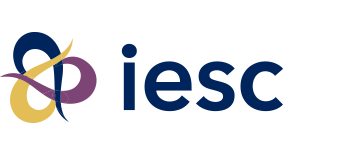Building Confidence for Export through Record Keeping and Traceability
Traceability System Helps Ghanaian Farmers Reach Export Markets
Faced with an export ban on five vegetable products starting in 2015 and increasing rejections of fresh fruit and vegetable shipments to the European Union, Ghana set a goal: meet internationally recognized food safety standards so that Ghanaian products can compete in international markets. One of the major challenges facing Ghana was the inability to effectively trace products from the field all the way to the point of export.

Volunteer LaTonia Lee (left) answers questions about agricultural record keeping.
A strong produce traceability system enables inspectors and customers to efficiently pinpoint food safety issues at any point along the produce value chain and to respond with decisive action. IESC supported Ghana in meeting its goal through USAID’s Improving Food Safety Systems Project (IFSSP) under a Farmer-to-Farmer Associate Award. IFSSP successfully developed a state-of-the-art traceability solution — tracking produce from seed to export — to ensure compliance with EU and other international food safety regulations.
The cornerstone of a strong traceability system is establishing and maintaining farm records so that issues can be identified and tracked along value chains. With support from volunteer experts like LaTonia Lee, an agricultural extension expert from Florida, IFSSP trained district agricultural extension officers and smallholder farmers on good agricultural record-keeping practices. Lee trained 528 farmers and agricultural extension officers in good record-keeping practices in order to access and use Ghana’s new traceability system for horticulture exports. Those trained are now prepared to track their own products and to participate in new export opportunities for the EU market, growing their businesses and generating new income.
“I know that farmers gained an understanding of the importance of keeping records for export purposes,” said Lee, “but I think they’re just beginning to realize how important good record-keeping is in expanding their production too.”
On February 14, 2018, IFSSP officially launched the pilot of the traceability system with a stakeholder forum. Ensuring that Ghana has a globally recognized platform for traceability builds confidence across international markets that Ghanaian horticulture is compliant with international standards and is safe for consumers. Ghana’s farmers and exporters can build up their export businesses with confidence that their products will not be constrained by other noncompliant actors in the market. Now bad produce can be tracked directly to the source of the problem and contained.
The three-year EU export ban cost Ghanaian farmers approximately $30 million in lost revenue. IFSSP and the exporters participating in the pilot are confident that such a ban will not be reinstated and that Ghanaian farmers will be able to increase their access to markets and increase incomes with the use of the traceability system.
The American people, through the U.S. Agency for International Development, have provided economic and humanitarian assistance worldwide for more than 50 years.
The John Ogonowski and Doug Bereuter Farmer-to-Farmer Program (F2F) provides technical assistance from U.S. volunteers to farmers, farm groups, agribusinesses and other agriculture sector institutions in developing and transitional countries with the goal of promoting sustainable improvements in food security and agricultural processing, production and marketing.

